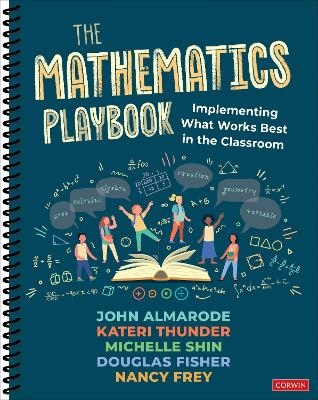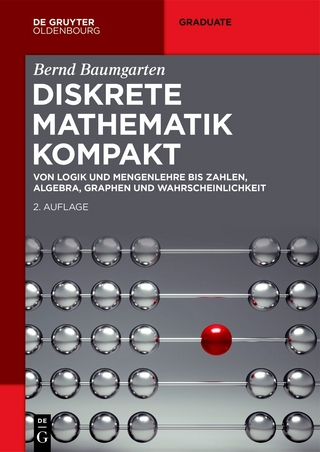
The Mathematics Playbook
Corwin Press Inc (Verlag)
978-1-0719-0765-8 (ISBN)
With the latest research on what works best in teaching and learning, The Mathematics Playbook is your comprehensive guide to enhancing mathematics teaching and learning. With a focus on fostering equity and maximizing student learning, the authors provide practical modules that integrate the latest research on effective teaching practices, and answer four critical questions:
How do we foster, nurture, and sustain mathematics learning?
How do we ensure all learners have equity of access and opportunity?
What are the non-negotiables in a high-quality mathematics task?
How do we know if learners really "get it"?
Through real-life examples and an emphasis on self-assessment and reflection, this playbook empowers you to create engaging and impactful learning experiences in mathematics.
Dr. John Almarode is a bestselling author and an Associate Professor of Education at James Madison University. He was awarded the inaugural Sarah Miller Luck Endowed Professorship in 2015 and received an Outstanding Faculty Award from the State Council for Higher Education in Virginia in 2021. Before his academic career, John started as a mathematics and science teacher in Augusta County, Virginia. As an author, John has written multiple educational books focusing on science and mathematics, and he has co-created a new framework for developing, implementing, and sustaining professional learning communities called PLC+. Dr. Almarode′s work has been presented to the US Congress, the Virginia Senate, and the US Department of Education. One of his recent projects includes developing the Distance Learning Playbook for College and University Instruction in response to the COVID-19 pandemic.Continuing his collaborative work with colleagues on what works best in teaching and learning, How Tutoring Works, Visible Learning in Early Childhood, and How Learning Works, all with Corwin Press, were released in 2021. Kateri Thunder, Ph.D., has the pleasure of collaborating with learners and educators from school divisions and early learning centers around the world to translate research into practice. She has served as an inclusive early childhood educator, an Upward Bound educator, a mathematics specialist, an assistant professor of mathematics education at James Madison University, and Site Director for the Central Virginia Writing Project. Her research, writing, and presentations focus on equity and access in early childhood and mathematics education, as well as the intersection of literacy and mathematics for teaching and learning. Kateri has collaborated with thousands of educators to catalyze change in their classrooms, centers, and schools. She is the chair of NCTM’s Research Committee and co-creator of The Math Diet. Additionally, she is a best-selling author for Corwin’s Teaching Mathematics in the Visible Learning Classroom Series, the Success Criteria Playbook, and Visible Learning in Early Childhood. Michelle Shin, Ed.D., is an educational consultant and brings over 15 years of experience and research to this role. She served as classroom teacher in mathematics and a site administrator in San Diego, California. She attended the University of California, San Diego, and received her Bachelor’s in Mathematics/Secondary Education and a Master’s Degree in Education. She also went to San Diego State University, where she wrote her dissertation, “Trust: An Essential Focus for Effective Leadership,” and earned a doctoral degree in Educational Leadership in PreK to 12. Douglas Fisher is professor and chair of educational leadership at San Diego State University and a leader at Health Sciences High and Middle College. Previously, Doug was an early intervention teacher and elementary school educator. He is a credentialed teacher and leader in California. In 2022, he was inducted into the Reading Hall of Fame by the Literacy Research Association. He has published widely on literacy, quality instruction, and assessment, as well as books such as Welcome to Teaching, PLC+, Teaching Students to Drive their Learning, and Student Assessment: Better Evidence, Better Decisions, Better Learning. Nancy Frey is professor of educational leadership at San Diego State University and a leader at Health Sciences High and Middle College. Previously, Nancy was a teacher, academic coach, and central office resource coordinator in Florida. She is a credentialed special educator, reading specialist, and administrator in California. She is a member of the International Literacy Association’s Literacy Research Panel. She has published widely on literacy, quality instruction, and assessment, as well as books such as The Artificial Intelligences Playbook, How Scaffolding Works, How Teams Work, and The Vocabulary Playbook.
Module 1: What are the essential elements of mathematics teaching and learning?
Module 2: How do I identify the elements of mathematics teaching and learning for my classroom?
Module 3: How do I evaluate the inclusion of all aspects of mathematics teaching and learning into my classroom?
Module 4: What is a mathematics learner, and what makes a mathematics learner in my classroom?
Module 5: What is an engaged mathematics learner?
Module 6: What are the misalignments, misconceptions, and missed opportunities in mathematical learning and engagement?
Module 7: What are the characteristics of a rigorous mathematics task?
Module 8: How do I facilitate math talk in my classroom?
Module 9: How do I implement worked examples into my classroom?
Module 10: How do I scaffold mathematics tasks in my classroom?
Module 11: How do I integrate deliberate practice into my classroom?
Module 12: How do I generate evidence of and for learning in my classroom?
Module 13: How do I notice the evidence in my classroom?
Module 14: What is the role of feedback in my classroom?
Module 15: How do I develop self-regulated mathematics learners?
| Erscheinungsdatum | 02.04.2024 |
|---|---|
| Verlagsort | Thousand Oaks |
| Sprache | englisch |
| Maße | 215 x 279 mm |
| Gewicht | 720 g |
| Themenwelt | Schulbuch / Wörterbuch |
| Mathematik / Informatik ► Mathematik | |
| Sozialwissenschaften ► Pädagogik | |
| ISBN-10 | 1-0719-0765-4 / 1071907654 |
| ISBN-13 | 978-1-0719-0765-8 / 9781071907658 |
| Zustand | Neuware |
| Haben Sie eine Frage zum Produkt? |
aus dem Bereich


